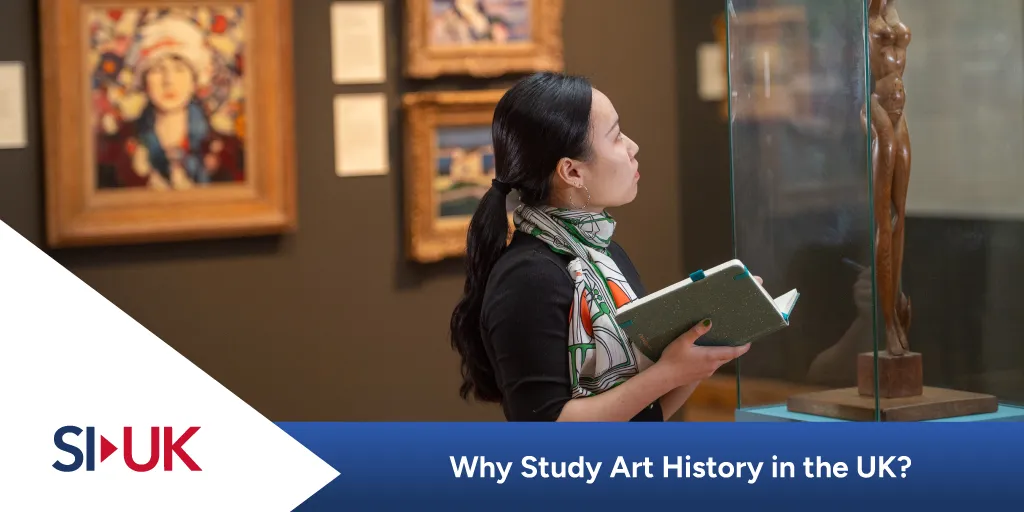Pursuing a history of art degree in the UK helps students walk through a journey of time, unravelling the intricate narratives and experiences that have shaped the modern era. From the beauty of mediaeval architecture to the astonishing stories hidden in the womb of history, going deeper into each part of history is an experience of a lifetime.
Learn more below, and to apply to study art in the UK, arrange a free consultation with SI-UK today.

5 Reasons Why You Should Study History of Art
1. World-class UK Universities
The UK has been a centre of the rich tradition of artistic excellence, with some of the world's most prestigious art schools and universities located within its borders. Institutions such as the Royal College of Art, the Courtauld Institute of Art, and the University of Cambridge rank in the top 10 UK universities for art history (QS World University Rankings 2024). UK art schools attract students worldwide to pursue their passion for art history in a vibrant and intellectually stimulating environment.
2. Multi-disciplinary Programmes
Art history is a multidisciplinary field that intersects with various academic disciplines, including anthropology, sociology, philosophy, and linguistics. An art history course explores art's aesthetic dimensions and its sociopolitical, economic, and cultural contexts. Students gain a holistic understanding of art's role in shaping human history and society by integrating insights from diverse fields.
In addition, the curriculum exposes you to different academic perspectives, enhances critical thinking skills, and promotes a fine approach to interpreting artistic expressions.
3. High Student Satisfaction
Studying art history is not merely related to academics; it's a journey of discovery and enlightenment that encourages imagination and intellectual curiosity. Exploring the stories behind iconic artworks, deciphering mysterious symbols, and unravelling the mysteries of art history can be both intellectually exciting and emotionally rewarding. This sense of fulfilment and satisfaction comes from the deep appreciation for art's transformative power to illuminate the human experience and surpass the boundaries of time and space.
4. Cultivate Critical Thinking
Analysing works of art requires more than just creative sensibility; it demands rigorous critical thinking and analytical skills. Art historians learn to examine artworks, deciphering hidden meanings and symbolic motifs embedded within them. By interrogating the socio-historical context of art, students develop the ability to contextualise artistic expressions within broader cultural and intellectual frameworks. Moreover, grappling with complex theoretical debates and interpretive challenges hones their analytical acumen, equipping them with valuable skills that transcend the field of art history.
5. Career Opportunities
In an increasingly globalised and interconnected world, the demand for individuals with a deep understanding of art history and cultural heritage has never been greater. A degree in art history opens up various career opportunities across diverse sectors, including museums, galleries, auction houses, cultural institutions, and academia. Whether it's curating exhibitions, conducting research, or teaching art history, graduates with a background in art history are well-positioned to make meaningful contributions to the cultural landscape of the 21st century.
Study History of Art in the UK
If you want to study an art degree in the UK, contact SI-UK today for a free consultation.
FAQ
Are there specific entry requirements for Indian students applying for this degree?
Entry requirements for Indian students applying for a history of arts degree in the UK typically include academic qualifications such as high school transcripts or equivalent certificates. Additionally, international students are required to demonstrate proficiency in English through standardised tests like the IELTS or Pearson PTE.
How long does a typical History of Arts degree in the UK take?
A typical history of arts degree in the UK usually takes three to four years for undergraduate programmes and one to two years for postgraduate programmes.
Are scholarships or financial aid options available for Indian students pursuing this degree?
Several scholarships and financial aid options are available for Indian students pursuing a history of arts degree in the UK. Many universities offer merit-based scholarships, need-based grants, or bursaries to international students, including those from India. External organisations, government agencies, and private foundations may provide funding opportunities for Indian students studying abroad.
How does studying the history of arts in the UK differ from pursuing it in India?
Studying art history in the UK offers several advantages over pursuing it in India. Firstly, the UK is home to some of the world's leading institutions renowned for their expertise in art history and extensive collections of artworks. Students studying in the UK benefit from exposure to diverse cultural experiences, access to world-class resources, and opportunities for networking and collaboration with scholars and professionals in the field. Besides, studying in the UK provides an international perspective on art history, allowing students to engage with global artistic traditions and contemporary debates.
Are there any specific visa requirements or procedures for Indian students studying history of art in the UK?
The visa application process involves submitting relevant documents, including a letter of acceptance from a UK university, proof of financial means to cover tuition fees and living expenses, and evidence of English language proficiency. Students need to familiarise themselves with the specific visa requirements and procedures outlined by the UK Visas and Immigration (UKVI) before applying for a student visa.


 I sincerely thank SI-UK for getting me accepted to UCL. The MSc in Urban Development and Planning is extremely competitive, but the right guidance provided by SI-UK made my dream of studying at University College London a reality. The services were exceptional from beginning to end.
I sincerely thank SI-UK for getting me accepted to UCL. The MSc in Urban Development and Planning is extremely competitive, but the right guidance provided by SI-UK made my dream of studying at University College London a reality. The services were exceptional from beginning to end. 

